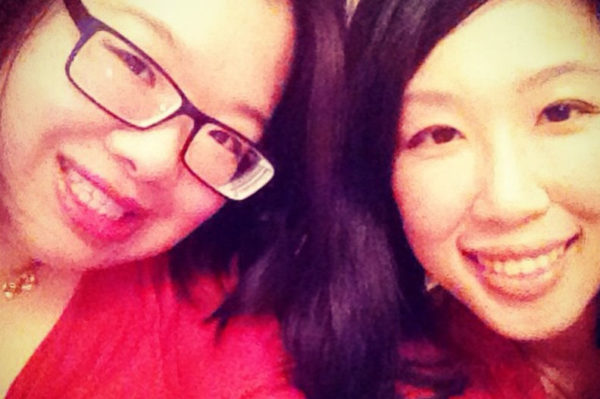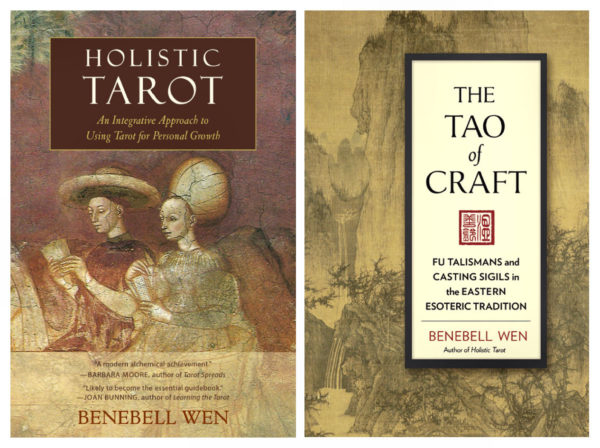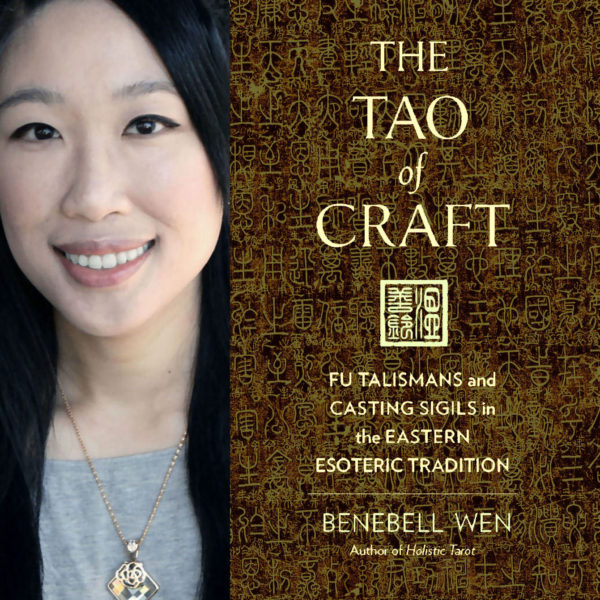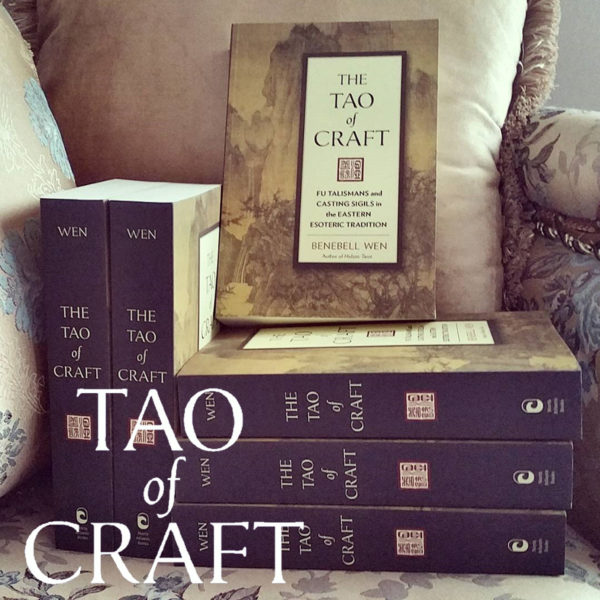
Our very own Akrypti has been quite busy since she went on a hiatus from covering APA social politics for 8Asians. She’s taken the tarot world by storm with her first book Holistic Tarot: An Integrative Approach to Using Tarot for Personal Growth back in 2015. Since its publication, Holistic Tarot became a bestseller in its category and has gone on to win four prominent book awards.
Now Akrypti—I mean Benebell—is coming out with her second book, one that circles back to her heritage and roots. The Tao of Craft: Fu Talismans and Casting Sigils in the Eastern Esoteric Tradition covers the history and cultural practice of Fu talismans, a form of sigil spell-casting, from its shamanic roots during the Xia, Shang, and Zhou Dynasties (roughly 2100 BC to 256 BC) and through its peaks in practice to the suppression and castigation of it during the Qing. More importantly, The Tao of Craft is arguably one of the first books published in the English language to cover the practical and instructional aspects of crafting Fu talismans and East Asian metaphysics, sorcery, and witchcraft.
At 600 pages, The Tao of Craft is a tome of a book. I sat down with my old friend Akrypti—again, I mean Benebell Wen—to talk about her second publication. The book will be out in stores September 27, but you can pre-order now on Amazon, Barnes & Noble, Penguin Random House, or through your favorite bookstore.
JOZ: So we’ve been good friends and have known each other through 8Asians for over a decade. Yet it was only a few years ago that I learned you were into metaphysical practices. Can you tell me more about that?
BELL: I’ve been into that kind of thing as early as I can remember and read books on these topics as soon as I gained literacy. Prior to the publication of Holistic Tarot, you’re right, I didn’t talk about these interests with others, and post-publication of the tarot book, I was thrust out of the shadows and put in a situation where I had to talk about it to promote my new book. That happened before I was actually ready for it, so it was interesting.
The Tao of Craft, I feel, is relevant to the Asian American community, which is why I think I’m okay with the Akrypti and Benebell link now. It’s relevant not just because I cover esoteric Taoism from a Chinese historic and cultural perspective, but for another funny little reason. You don’t see many Asian Americans writing prominently about esoteric Taoism. By and large publications on this topic are by white men (or native Chinese people who co-author with, you guessed it, white men). Ceremonial magic generally, whether you’re referring to Western mystery traditions or Eastern, is dominated by white men. That in part motivated me to speak up and attempt to have my voice heard in such an arena. I’m also hoping The Tao of Craft will appeal to Asian Americans.
JOZ: Why do you think The Tao of Craft is important for the Asian American community?
BELL: I can only tell you why this book was important for me. It brought me closer to my ethnic and cultural roots. I gained an appreciation for the depth and breadth of Chinese spiritual history. In so many ways, understanding all that I’ve come to understand through the research and writing of The Tao of Craft, I’m even prouder now of my heritage than I was before. For me, there’s something activist about reclaiming long-neglected spiritual traditions. The book is a resource for Asian Americans who want to reconnect with those roots.
To get a taste of the book, check out this appendix, which is a summary of the history of Taoism that I touch upon in The Tao of Craft. You can read more excerpts from the book here.
JOZ: Why do you think Asian Americans, most of whom I presume are not practitioners of Taoist magic, would be interested in this book?
BELL: The bulk of the book is research. It’s about history. We start with Neolithic shamans and archeological findings of oracle bones in northern China and how that became integrated into the talismanic practices of Taoist priests. We touch upon the political activism of Taoist ceremonial magicians during the Yellow Turban Rebellion. Many of the Eight Immortals were historically documented figures that later became mythologized. The legends we grow up with about how the Chinese civilization was founded by the Yellow Emperor involve magical battles and spell-crafting. Magic and esotericism are intertwined with military strategy.
We look at several well-known Taoist magical lineages or mystery traditions and how they influenced Chinese history. Why are Buddhist and Taoist practices often intertwined? What are the origins of the Chinese lunar calendar? To me, the Chinese metaphysical principles of Qi, yin and yang, the Wu Xing, Ba Gua, He Tu and Lo Shu are provocative. As a Chinese/Taiwanese American, The Tao of Craft pays homage to where I come from. To realize that in the nucleus of who I am is this incredible history feels empowering. If for nothing else, this book should be interesting to Asian Americans for the research aspect.
JOZ: Are you afraid that linking your past work under Akrypti with what you’re trying to do now under Benebell Wen will somehow discredit one another? Do you think Asian Americans who resonate with your race politics militancy will be put off by your dabblings in the metaphysical world and fans of your metaphysical work will be put off by your race politics?
BELL: Yes, of course. And it’s bound to happen. The only thing that comforts me, even though it doesn’t really comfort me, is everything I’ve written, whether it was under Akrypti here at 8Asians or now through my books, is authentic and sincere to who I am. Also, those who decide one discredits the other aren’t being rational; they’re being emotional.
JOZ: So are you a full-time writer now?
BELL: No, I am still working as a lawyer full-time, though I’m at work on a third book already and will continue to research and write books on the side. I’m living out that tiger mom’s dream and also my own.
The Tao of Craft will be released September 27, 2016. You can pre-order now via Amazon.
The publisher is currently running a contest and you can win a free copy of the book before its release date. To enter, check out the details here. Deadline for the contest is September 16.











